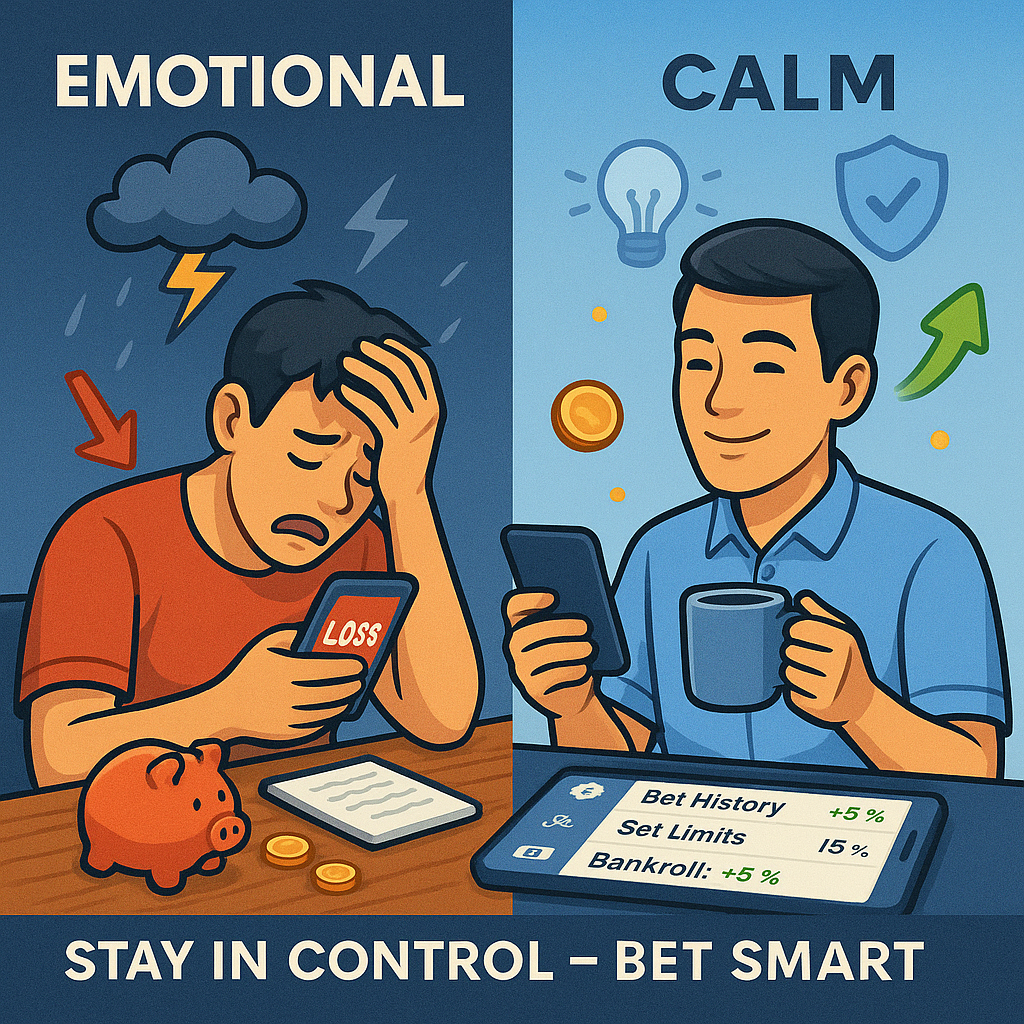The text message arrived moments after the final whistle: “I’ve done it again. Blew my entire bankroll chasing that City game.” My friend—normally rational and disciplined—had just incinerated a month’s betting budget in ninety minutes of emotional spiral. I’ve spent fifteen years interviewing winners and losers across the betting landscape, and one truth remains constant: emotions, not analysis, determine most bettors’ financial fate. Last month, while researching professional gambling operations, I watched a veteran trader walk away from his desk during a critical match. When I asked why, his answer was revealing: “I felt myself getting emotional. That’s a signal to step away—always.” This disciplined self-awareness represents the fundamental difference between professionals and amateurs. The mathematics and analysis of sports betting are relatively straightforward—it’s the psychology that crushes most players. In a candid moment during a betting workshop in Manchester, a bookmaker admitted something shocking: “We don’t profit most from uninformed bettors—we profit from emotional ones.” The industry understands what most bettors don’t: your greatest enemy isn’t the bookmaker, the market, or bad luck—it’s your own emotional reactivity. Today, I’m sharing the psychological techniques that separate the consistently profitable minority from the emotional majority, techniques I’ve gathered from the true professionals who treat betting as a disciplined financial endeavor rather than an emotional rollercoaster.
The Psychology of Loss: Understanding the Emotional Traps That Destroy Betting Bankrolls
The battle between emotional and rational decision-making begins in your brain—specifically, the ongoing conflict between your limbic system (emotional center) and prefrontal cortex (rational thinking). Under betting stress, the limbic system often hijacks decision-making, triggering reactions that feel compelling in the moment but lead to objectively poor choices.
This neurological hijacking explains why ordinarily sensible people make catastrophic betting decisions when emotions run high. The chemical cascade of stress hormones literally impairs access to the brain regions responsible for logical thinking, probability assessment, and bankroll discipline. Understanding this biological reality helps explain why “just be disciplined” is insufficient advice—you’re fighting powerful neurological processes designed for survival, not optimal betting decisions.
Loss Aversion: The Most Expensive Emotion
Behavioral economists have conclusively demonstrated that humans feel losses approximately twice as intensely as equivalent gains—a phenomenon known as loss aversion. This asymmetric emotional response creates destructive betting behaviors, particularly the overwhelming urge to “get even” after losses, leading to increased stake sizes precisely when judgment is most compromised.
The Sunk Cost Fallacy in Action
The sunk cost fallacy—continuing a behavior based on previously invested resources—manifests powerfully in betting contexts. When bettors have lost significant amounts, they irrationally feel compelled to continue betting on the same game, team, or session rather than accepting the loss and resetting emotionally. This psychological trap turns manageable losses into bankroll disasters through escalating commitment to failed approaches.
Confirmation Bias Under Pressure
Under emotional stress, bettors display heightened confirmation bias—seeking information that supports existing positions while dismissing contradictory evidence. This selective perception becomes particularly dangerous when evaluating in-play betting opportunities, as emotional bettors dramatically overweight information supporting their pre-existing views while dismissing clear signals that contradict their positions.
Building Your Mental Fortress: Practical Techniques for Emotional Control While Betting
Developing emotional regulation skills specific to betting scenarios requires both preventative practices and in-the-moment techniques. The professional bettors I’ve studied invest as much in their psychological preparation as their analytical methodologies, recognizing that emotional control directly impacts their bottom line.
The foundation of betting emotional control begins with meditation and mindfulness practices specifically targeted at recognizing emotional states without acting on them. Regular meditation practice strengthens the neural pathways connecting your prefrontal cortex (rational brain) with your limbic system (emotional brain), literally building your brain’s ability to maintain rational control under betting stress.
Physical State Management
Your physical state directly impacts emotional regulation capacity. Professional bettors maintain specific routines around sleep, hydration, and alcohol consumption—particularly before significant betting sessions. The degradation in decision quality after even minor sleep deprivation has been conclusively demonstrated in multiple studies, with judgment impairment comparable to alcohol intoxication after missing just 1-2 hours of regular sleep.
The Implementation Intention Strategy
Implementation intentions—pre-planned responses to anticipated situations—create powerful behavioral guardrails against emotional decisions. This psychological technique involves creating specific “if-then” contingency plans: “If I lose three consecutive bets, then I will take a mandatory 2-hour break before placing another bet.” By deciding your response in advance, you bypass the emotional decision-making process during moments of heightened stress.
The Voice Recording Technique
One particularly effective strategy I’ve observed among disciplined bettors involves voice recording their analysis and betting rationale before placing significant wagers. During emotional moments questioning their approach, they listen to their own calm, rational pre-bet analysis to reconnect with their methodology. This pattern-interrupt technique helps overcome in-the-moment emotional reactions by reconnecting with your rational analysis.
The Pre-Bet Ritual: Creating Systems That Override Emotional Decision-Making
Systematic pre-bet protocols create structural protection against emotional betting far more effective than willpower alone. These operational procedures function as decision-making infrastructure that maintains rationality when emotions would otherwise dominate.
The cornerstone of emotional betting prevention is a standardized pre-bet checklist—a mandatory protocol completed before any wager regardless of perceived opportunity quality or time constraints. This systematic approach ensures consistent evaluation criteria while creating critical decision-making distance between impulse and action. The most effective checklists include specific bet qualification criteria, position sizing formulas, and mandatory alternative perspective consideration.
Here’s where disciplined betting begins:
- Written staking rules determined before betting sessions begin
- Mandatory pre-bet checklist completion for every wager
- Clear criteria distinguishing between “research” and “entertainment” bets
- Time delay requirements between bet identification and placement
- Preset betting windows that prevent off-hours impulsive wagering
- Written trade plans noting specific exit conditions regardless of outcome
The betting journal represents another crucial system for emotional regulation—a contemporaneous record of not just wagers but the psychological and situational context surrounding them. By documenting emotional states, confidence levels, and decision triggers alongside actual bets, patterns emerge revealing your specific emotional vulnerabilities. This self-knowledge allows creating personalized guardrails around your particular psychological blind spots.
Red Alert: Recognizing Your Personal Emotional Betting Triggers Before They Strike
While general emotional management techniques provide a foundation, truly effective betting psychology requires identifying your specific emotional triggers and vulnerability patterns. These personal risk factors vary dramatically between individuals but create predictable behavioral patterns when activated.
The starting point for this self-awareness is bet tracking that includes psychological context—documenting emotional states, confidence levels, and situational factors alongside traditional bet details. After accumulating sufficient data (typically 100+ tracked bets), clear patterns emerge connecting specific contexts with poor decision quality.
- Identify specific loss thresholds that consistently trigger emotional responses
- Recognize particular sports, teams, or bet types that generate heightened emotion
- Document time periods where emotional control typically weakens (late nights, weekends)
- Note external life stressors that correlate with betting discipline breakdown
- Track betting volume changes that precede emotional spirals
Through detailed interview work with bettors across experience levels, I’ve identified several common high-risk scenarios that disproportionately trigger emotional betting: wagering on favorite teams, betting during or after alcohol consumption, increasing stake sizes following significant losses, and betting in response to external life stressors. Each bettor develops unique vulnerability fingerprints that become predictable once properly documented.
Where tracking becomes particularly powerful is in identifying idiosyncratic triggers unique to your psychological makeup. One consistently profitable bettor I interviewed through his 1xbet account discovered through meticulous tracking that his decision quality deteriorated specifically when betting from his phone rather than computer—a platform-specific vulnerability he addressed by implementing additional verification steps for mobile wagers.
Recovery Protocols: Bouncing Back From Emotional Betting Episodes Without Spiraling
Even the most disciplined bettors occasionally experience emotional decision-making episodes. The difference between these temporary lapses becoming catastrophic or merely educational lies in having established recovery protocols that prevent emotional spirals while extracting maximum learning value from these incidents.
The immediate recovery protocol begins with a mandatory cooling-off period proportional to the severity of the emotional episode. This time-out—typically 24-72 hours for significant incidents—creates psychological distance necessary for rational self-assessment while preventing the common pattern of increasingly desperate “recovery bets” that compound initial losses.
The Post-Mortem Analysis Process
Effective recovery requires structured analysis of emotional betting episodes rather than simply trying to forget them. The most valuable approach involves written examination of the triggering events, emotional progression, decision points where intervention was possible, and specific process breakdowns that allowed emotional override of established systems.
Bankroll Recalibration Without Punishment
After emotional betting episodes, bankroll management requires careful recalibration—reducing stake sizes proportional to bankroll damage while avoiding excessive risk reduction that creates a punishment mindset. This balanced approach acknowledges the financial reality of losses while maintaining the positive psychological framework necessary for quality decision-making moving forward.
The Mentor Disclosure Technique
One particularly powerful recovery practice involves disclosure of emotional betting episodes to a trusted betting colleague, mentor, or accountability partner. This deliberate vulnerability serves multiple purposes: it prevents minimization of the incident, creates external accountability for improvement, and often reveals perspective or pattern recognition invisible from within your own experience.
The Long-Term Mindset: Cultivating Emotional Resilience for Betting Success
Beyond specific techniques and systems, sustained betting success requires developing a fundamentally different relationship with variance, uncertainty, and outcome evaluation. This psychological foundation—what professionals often call the “long-term mindset”—represents the ultimate emotional regulation framework.
The core of this mindset shift involves result detachment—separating your assessment of decision quality from outcome results. This critical distinction allows maintaining confidence in fundamentally sound betting approaches despite inevitable losing periods while remaining analytically critical of winning bets that resulted from poor processes. Without this detachment, bettors frequently abandon sound strategies during variance-driven losing streaks while reinforcing fundamentally flawed approaches that produce short-term positive outcomes.
The Sample Size Perspective
Emotional resilience significantly improves when viewing individual bets as minimal-significance data points within a large sample rather than meaningful events in isolation. This statistical perspective—thinking in terms of 500-bet samples rather than individual wagers—naturally dampens emotional reactivity to short-term results while maintaining focus on process quality.
Identity Separation From Outcomes
Perhaps the most fundamental psychological shift involves separating your identity and self-worth from betting results. Professionals maintain clear distinction between their betting activities and personal value, viewing wagering as a specialized skill rather than a reflection of intelligence or worth. This separation creates emotional space that prevents the common amateur pattern where losing bets become personal failures requiring immediate redemption.
The Progress Over Perfection Framework
Sustainable emotional resilience requires embracing a growth-oriented perspective that values incremental improvement over binary success/failure evaluation. This approach recognizes that emotional management develops through consistent practice rather than immediate transformation, celebrating progress in areas like reduced recovery time after losses, improved adherence to systems during stressed states, and increased self-awareness during emotional triggers.
Beyond Techniques: The Philosophy of Emotional Betting Control
The journey toward emotional betting control ultimately transcends specific techniques to embrace a fundamentally different philosophy about the activity itself. This perspective shift reframes betting from an emotional outcome-driven pursuit to a process-oriented probabilistic endeavor—a profound transformation that naturally aligns psychological responses with mathematical realities.
At its core, this philosophical approach views betting not as a series of wins and losses but as a continuous refinement of decision quality under uncertainty. Emotional reactions like disappointment following “good bets that lose” or satisfaction after “bad bets that win” become recognized as counterproductive responses misaligned with the fundamental nature of probabilistic activities.
The most emotionally resilient bettors maintain this sophisticated perspective even in high-variance periods, understanding that their advantage manifests through process quality applied consistently across large samples rather than individual outcomes. This mathematically aligned mindset creates natural emotional equilibrium—you cannot feel devastated by inevitable variance when you genuinely understand and accept its fundamental role in the activity.
The ultimate emotional control paradox is that the pursuit of betting profit becomes most successful when you focus least on immediate financial outcomes. By redirecting attention from results to process, from short-term variance to long-term expectation, and from emotional reaction to analytical refinement, you develop not just better betting discipline but a fundamentally healthier relationship with uncertainty itself—perhaps the most valuable skill betting can teach.



